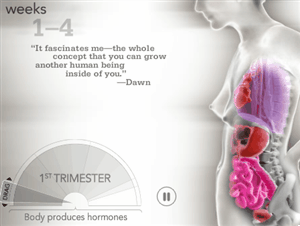First trimester: you feel sick, you feel tired, and tradition states that you’re generally not supposed to tell people much about why[1]. It’s like having a light flu for eight weeks — it’s not painful, but it’s kind of miserable.
I managed to adapt. I carried around my emergency backup tupperware[2], learned to sit near the front of the bus (especially on double buses), went to bed early, and stopped feeling guilty about taking a break during the day or sleeping in and getting in late. I figured out what foods I could reliably eat, and they were available every day. My husband was there to take on the parts of the load at home I couldn’t handle and make sure I ate, even when everything sounded disgusting. I appreciated having the worst of my nausea during the holiday season — you can eat a whole candy cane without getting the looks you’d get if you downed a whole bag of peppermints in the same time.
I was several weeks into my period of nausea and fatigue when I realized that much of my ability to adapt was due to the flexibility I have in my job, and much of my willingness to adapt was because this is a very wanted baby. I started to imagine what it would be like to deal with this if I had an inflexible job — a job where being late means getting fired, a job where I have no control over my hours (or no fixed hours at all), a job where taking a day off means not getting paid, a job where I couldn’t schedule my breaks when I needed them. Or imagine if I didn’t want the pregnancy, if I were forced to spend weeks feeling like my performance and happiness suffered. Even worse if I was contending against both. Suppose I had another child and no partner but somehow had to keep my home running while feeling barely able to take care of myself.
I am extremely fortunate to be carrying a baby I want in a situation where I have support and incredible flexibility. A pregnancy is only an “inconvenience” a woman is too selfish to put up with if she’s fortunate. When even a couple of days of being sick is the difference between being able to pay the rent or not, when you don’t have much choice in what you have available to eat, when you can’t get the sleep your body so desperately needs, pregnancy is a huge challenge, and one that no one should be forced to take involuntarily.
[1] Because the chance of miscarriage is high enough. Many people find it harder to deal with the disappointment of loss if they also have to deal with the grief or sympathy of others.
[2] Much easier to handle than a plastic bag if you won’t be getting off the bus for awhile yet.

